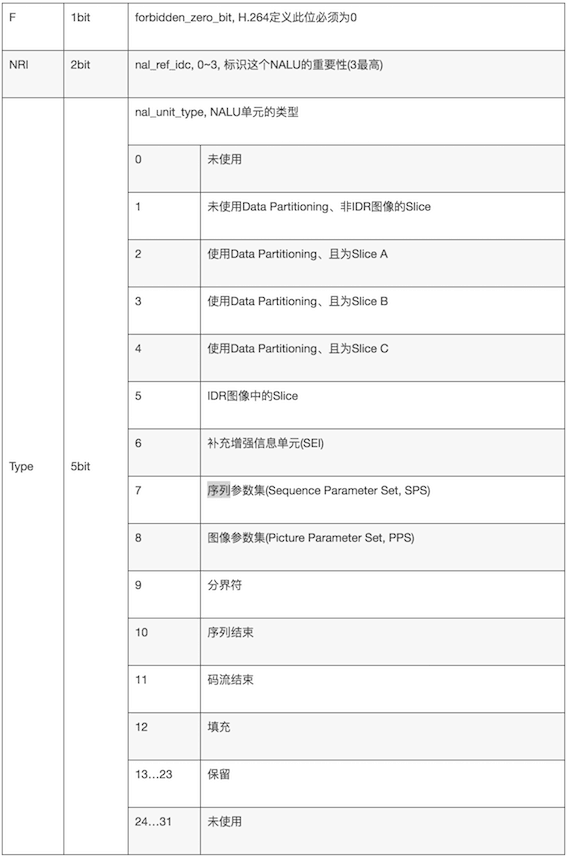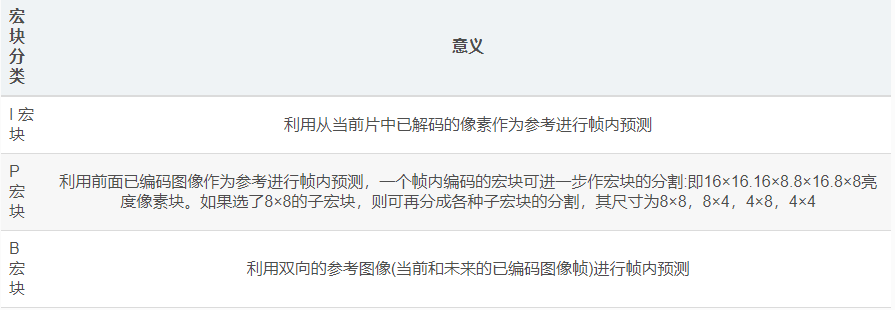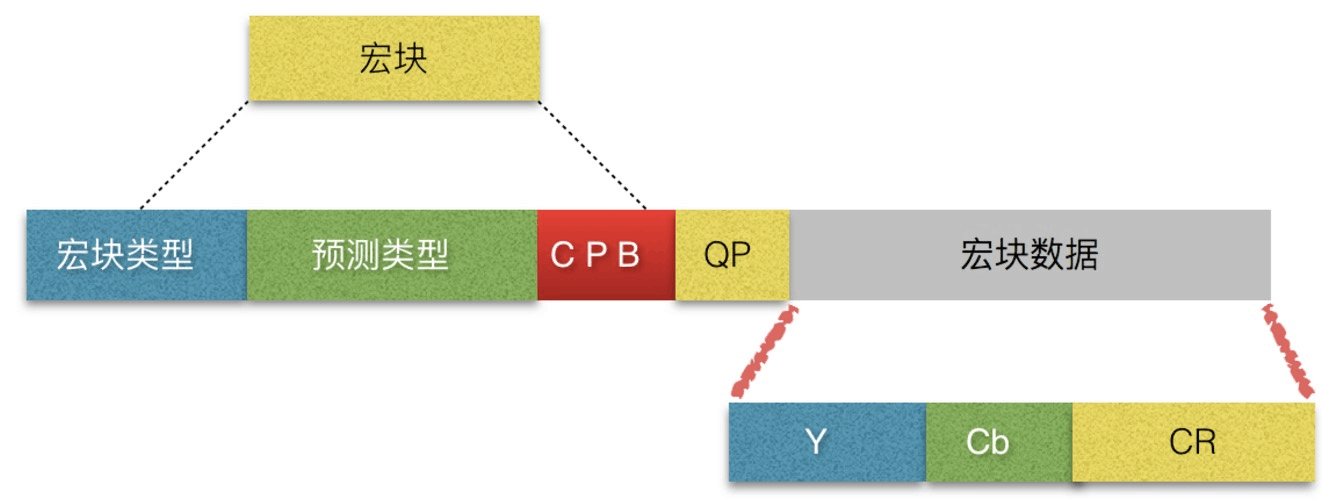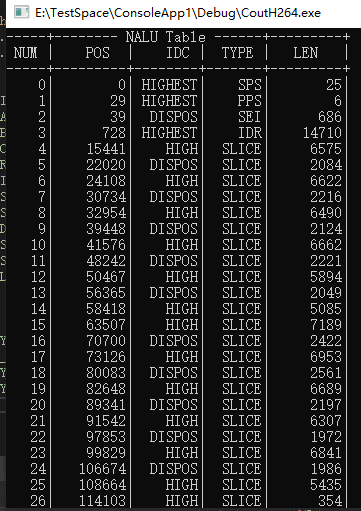H.264原始码流由NALU组成。
功能分为两层:VCL(video coding layer)、NAL(network abstraction layer)
其中每个NALU之间通过startcode(起始码)进行分隔,起始码分成两种:0x000001或者0x00000001。
如果NALU对应的Slice为一帧的开始就用0x00000001,否则就用0x000001。
NALU = NALU Header + BRSP(Raw Byte Squence Payload)
1、NALU Header(1Byte)

2、RBSP

SODB与RBSP
SODB 数据比特串 -> 是编码后的原始数据.
RBSP 原始字节序列载荷 -> 在原始编码数据的后面添加了 结尾比特。一个 bit“1”若干比特“0”,以便字节对齐。
H.264全面观

1 frame = n slice;1 slice = n Macroblock;1 Macroblock= 16 * 16yuv。
3、Slice
Slice = Slice Header + Slice Data
片是H.264提出的新概念,通过编码图片后切分通过高效的方式整合出来的概念。一张图片有一个或者多个片,而片由NALU装载并进行网络传输的。
但是NALU不一定是切片,这是充分不必要条件,因为 NALU 还有可能装载着其他用作描述视频的信息.
那么为什么要设置片呢?
设置片的目的是为了限制误码的扩散和传输,应使编码片相互间是独立的。某片的预测不能以其他片中的宏块为参考图像,这样某一片中的预测误差才不会传播到其他片中。
可以看到上图中,每个图像中,若干宏块(Macroblock)被排列成片。一个视频图像可编程一个或更多个片,每片包含整数个宏块 (MB),每片至少包含一个宏块。
片有一下五种类型:

4、Macroblock
1 macroblock = 16*16Y + 8*8 Cb + 8*8 Cr




链接:https://blog.csdn.net/andywang201001/article/details/80274886
typedef enum { NALU_TYPE_SLICE = 1, NALU_TYPE_DPA = 2, NALU_TYPE_DPB = 3,8 NALU_TYPE_DPC = 4, NALU_TYPE_IDR = 5, NALU_TYPE_SEI = 6, NALU_TYPE_SPS = 7, NALU_TYPE_PPS = 8, NALU_TYPE_AUD = 9, NALU_TYPE_EOSEQ = 10, NALU_TYPE_EOSTREAM = 11, NALU_TYPE_FILL = 12, } NaluType; typedef enum { NALU_PRIORITY_DISPOSABLE = 0, NALU_PRIRITY_LOW = 1, NALU_PRIORITY_HIGH = 2, NALU_PRIORITY_HIGHEST = 3 } NaluPriority; typedef struct { int startcodeprefix_len; //! 4 for parameter sets and first slice in picture, 3 for everything else (suggested) unsigned len; //! Length of the NAL unit (Excluding the start code, which does not belong to the NALU) unsigned max_size; //! Nal Unit Buffer size int forbidden_bit; //! should be always FALSE int nal_reference_idc; //! NALU_PRIORITY_xxxx int nal_unit_type; //! NALU_TYPE_xxxx char *buf; //! contains the first byte followed by the RBSP } NALU_t; FILE *h264bitstream = NULL; //!< the bit stream file int info2 = 0, info3 = 0; static int FindStartCode2(unsigned char *Buf) { if (Buf[0] != 0 || Buf[1] != 0 || Buf[2] != 1) return 0; //0x000001? else return 1; } static int FindStartCode3(unsigned char *Buf) { if (Buf[0] != 0 || Buf[1] != 0 || Buf[2] != 0 || Buf[3] != 1) return 0;//0x00000001? else return 1; } int GetAnnexbNALU(NALU_t *nalu) { int pos = 0; int StartCodeFound, rewind; unsigned char *Buf; if ((Buf = (unsigned char*)calloc(nalu->max_size, sizeof(char))) == NULL) printf("GetAnnexbNALU: Could not allocate Buf memory "); nalu->startcodeprefix_len = 3; if (3 != fread(Buf, 1, 3, h264bitstream)) { free(Buf); return 0; } info2 = FindStartCode2(Buf); if (info2 != 1) { if (1 != fread(Buf + 3, 1, 1, h264bitstream)) { free(Buf); return 0; } info3 = FindStartCode3(Buf); if (info3 != 1) { free(Buf); return -1; } else { pos = 4; nalu->startcodeprefix_len = 4; } } else { nalu->startcodeprefix_len = 3; pos = 3; } StartCodeFound = 0; info2 = 0; info3 = 0; while (!StartCodeFound) { if (feof(h264bitstream)) { nalu->len = (pos - 1) - nalu->startcodeprefix_len; memcpy(nalu->buf, &Buf[nalu->startcodeprefix_len], nalu->len); nalu->forbidden_bit = nalu->buf[0] & 0x80; //1 bit nalu->nal_reference_idc = nalu->buf[0] & 0x60; // 2 bit nalu->nal_unit_type = (nalu->buf[0]) & 0x1f;// 5 bit free(Buf); return pos - 1; } Buf[pos++] = fgetc(h264bitstream); info3 = FindStartCode3(&Buf[pos - 4]); if (info3 != 1) info2 = FindStartCode2(&Buf[pos - 3]); StartCodeFound = (info2 == 1 || info3 == 1); } // Here, we have found another start code (and read length of startcode bytes more than we should // have. Hence, go back in the file rewind = (info3 == 1) ? -4 : -3; if (0 != fseek(h264bitstream, rewind, SEEK_CUR)) { free(Buf); printf("GetAnnexbNALU: Cannot fseek in the bit stream file"); } // Here the Start code, the complete NALU, and the next start code is in the Buf. // The size of Buf is pos, pos+rewind are the number of bytes excluding the next // start code, and (pos+rewind)-startcodeprefix_len is the size of the NALU excluding the start code nalu->len = (pos + rewind) - nalu->startcodeprefix_len; memcpy(nalu->buf, &Buf[nalu->startcodeprefix_len], nalu->len);// nalu->forbidden_bit = nalu->buf[0] & 0x80; //1 bit nalu->nal_reference_idc = nalu->buf[0] & 0x60; // 2 bit nalu->nal_unit_type = (nalu->buf[0]) & 0x1f;// 5 bit free(Buf); return (pos + rewind); } /** * Analysis H.264 Bitstream * @param url Location of input H.264 bitstream file. */ int simplest_h264_parser(char *url) { NALU_t *n; int buffersize = 100000; FILE *myout = stdout; h264bitstream = fopen(url, "rb+"); if (h264bitstream == NULL) { printf("Open file error "); return 0; } n = (NALU_t*)calloc(1, sizeof(NALU_t)); if (n == NULL) { printf("Alloc NALU Error "); return 0; } n->max_size = buffersize; n->buf = (char*)calloc(buffersize, sizeof(char)); if (n->buf == NULL) { free(n); printf("AllocNALU: n->buf"); return 0; } int data_offset = 0; int nal_num = 0; printf("-----+-------- NALU Table ------+---------+ "); printf(" NUM | POS | IDC | TYPE | LEN | "); printf("-----+---------+--------+-------+---------+ "); while (!feof(h264bitstream)) { int data_lenth; data_lenth = GetAnnexbNALU(n); char type_str[20] = { 0 }; switch (n->nal_unit_type) { case NALU_TYPE_SLICE:sprintf(type_str, "SLICE"); break; case NALU_TYPE_DPA:sprintf(type_str, "DPA"); break; case NALU_TYPE_DPB:sprintf(type_str, "DPB"); break; case NALU_TYPE_DPC:sprintf(type_str, "DPC"); break; case NALU_TYPE_IDR:sprintf(type_str, "IDR"); break; case NALU_TYPE_SEI:sprintf(type_str, "SEI"); break; case NALU_TYPE_SPS:sprintf(type_str, "SPS"); break; case NALU_TYPE_PPS:sprintf(type_str, "PPS"); break; case NALU_TYPE_AUD:sprintf(type_str, "AUD"); break; case NALU_TYPE_EOSEQ:sprintf(type_str, "EOSEQ"); break; case NALU_TYPE_EOSTREAM:sprintf(type_str, "EOSTREAM"); break; case NALU_TYPE_FILL:sprintf(type_str, "FILL"); break; } char idc_str[20] = { 0 }; switch (n->nal_reference_idc >> 5) { case NALU_PRIORITY_DISPOSABLE:sprintf(idc_str, "DISPOS"); break; case NALU_PRIRITY_LOW:sprintf(idc_str, "LOW"); break; case NALU_PRIORITY_HIGH:sprintf(idc_str, "HIGH"); break; case NALU_PRIORITY_HIGHEST:sprintf(idc_str, "HIGHEST"); break; } fprintf(myout, "%5d| %8d| %7s| %6s| %8d| ", nal_num, data_offset, idc_str, type_str, n->len); data_offset = data_offset + data_lenth; nal_num++; } //Free if (n) { if (n->buf) { free(n->buf); n->buf = NULL; } free(n); } return 0; }

链接:https://blog.csdn.net/leixiaohua1020/article/details/50534369